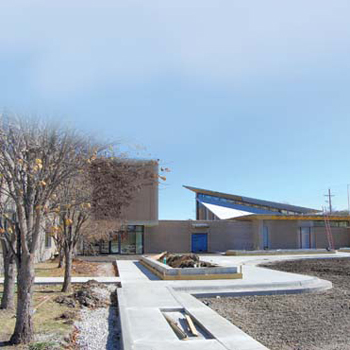 |
| After ending its state of financial exigency in May 2007, Central Baptist Theological Seminary started to grow. The library is being expanded and the new Baugh-Marshall Chapel, above, will be complete in 2011. |
Invited to offer a session on financial exigency at this year’s ATS Biennial Meeting in Montreal, I wondered about being known as an “expert” on this topic. Our workshop was sparsely attended — perhaps a testimony to the suspicion and fear that haunts the prospect of economic distress. As I presented a case study about why declaring financial exigency was essential for our school’s future, I spoke positively about the outcomes, which make me glad our board took this route.
A caveat is in order from the outset: I am not glad about the dislocation suffered by faculty and staff colleagues whose positions were eliminated. This was exceedingly painful for our institution — and for me. Back then, in May 2005, I was the new president of Central Baptist Theological Seminary, and I was suddenly forced to think more institutionally than personally. I knew that we had to deal with excess capacity in both faculty and staff — the largest area in our operating costs — if we were to survive. But as a faculty member who had been terminated at my former school, I knew the life-scrambling reality this would inexorably produce, and I felt terrible.
Five years later, I can see the positive impact on our school. Our board of trustees took an action that was transformative in several ways:
-
Our board awakened to the peril and urgency of the school’s financial fragility. While there had been a couple of whistle-blowers on the board, their voices had been muted. Their board colleagues, along with senior administrators, had spiritualized financial issues and refused to take the extreme measures necessary. When convinced that exigency did not mean institutional death but a chance for a hopeful future, the board acted with great courage.
-
Our accrediting bodies believed we were at long last serious about our institutional sustainability. Both our accrediting agencies (the Association of Theological Schools and the Higher Learning Commission of the North Central Association of Colleges and Schools) had been warning the seminary that we could not continue on this perilous pathway with our “alarmingly weak” reserve ratio. Moving from accrual to cash accounting practices allowed us to see exactly how far we were from financial equilibrium. I am convinced that the reason we have no financial notations or warnings now is that we addressed the warranted concerns of our accrediting bodies then.
-
Our donors appreciated fiscal truth-telling after years of worry about the opaqueness of financial statements. This may seem counterintuitive, but our fundraising efforts over the past three years have returned the best results in our institution’s history. Our donors, both old and new, deepened their confidence in Central’s willingness to embrace fiscal sobriety while we pursued creative initiatives in theological education. Money has followed renewed mission.
-
Our remaining faculty and staff members have developed a culture of entrepreneurial thinking. We are moving from a “silo” mentality — in which academic division did not have to be encumbered with issues of institutional advancement and operations — to a much greater degree of alignment. Generative ideas for new revenue streams now bubble up anywhere in the seminary, and such thinking is welcomed. Decisions are made with an eye toward forward-thinking business practices.
Like matrimony, financial exigency is not to be entered into lightly. Yet, for the sake of long-term institutional health, it may be the best route for a theological school. It surely has made it possible for Central to renew its vocation for the future.




























